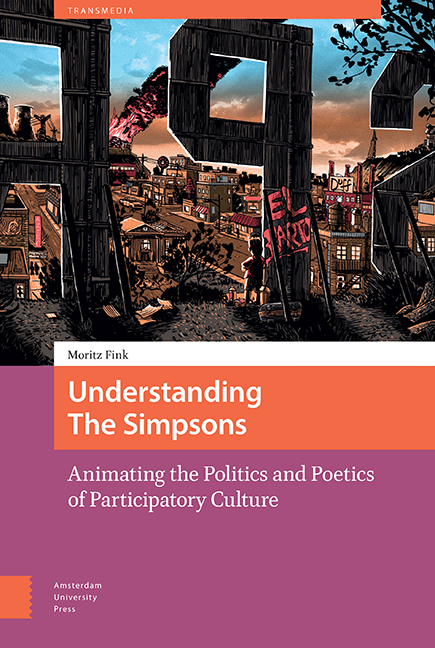Book contents
- Frontmatter
- Dedication
- Contents
- List of Images
- Acknowledgments
- Preface to the AUP Edition
- Introduction
- 1 Bart Talks Back: The Politics and Poetics of Participatory Culture
- 2 Alternative TV: The Genesis of The Simpsons
- 3 More than Just a Cartoon: Meta-Television Culture and the Age of Irony
- 4 High Fives on Prime Time: Representing Popular Culture
- 5 At the Edge of Convergence Culture: Engaging in the Simpsons Cult
- 6 Echoes of Springfield: The Simpsons in Remix Culture
- Conclusion: The Simpsons, Cultural Feedback Loops, and the Case of Apu
- Bibliography
- Index
Conclusion: The Simpsons, Cultural Feedback Loops, and the Case of Apu
Published online by Cambridge University Press: 21 October 2021
- Frontmatter
- Dedication
- Contents
- List of Images
- Acknowledgments
- Preface to the AUP Edition
- Introduction
- 1 Bart Talks Back: The Politics and Poetics of Participatory Culture
- 2 Alternative TV: The Genesis of The Simpsons
- 3 More than Just a Cartoon: Meta-Television Culture and the Age of Irony
- 4 High Fives on Prime Time: Representing Popular Culture
- 5 At the Edge of Convergence Culture: Engaging in the Simpsons Cult
- 6 Echoes of Springfield: The Simpsons in Remix Culture
- Conclusion: The Simpsons, Cultural Feedback Loops, and the Case of Apu
- Bibliography
- Index
Summary
Abstract
The concluding chapter revisits the central idea behind this book—The Simpsons’ trajectory into the age of convergence culture. More specifically, the chapter discusses notions of the civic imagination and fan activism in relation to The Simpsons, as well as the contested relationship between the producers of a profitable media franchise and participatory culture. In this connection, I interrogate the idea of cultural participation going full circle and feeding back to the original text. Traditionally, the media industries have resisted interference with what they consider their intellectual property. But at the same time, they have to open up their work to popular discourse in order for a product to remain popular and thus to survive in the marketplace of convergence culture.
Keywords: The Simpsons, convergence culture, intellectual property, fan activism, cultural feedback loops, Apu Nahasapeemapetilon
In reaction to U.S. President Trump's 2020 State of the Union address—as well as to Trump's failure to answer the obligatory handshake—the Speaker of the House of Representatives, Nancy Pelosi, demonstratively ripped up her paper copy of the speech. In response, U.S. Secretary of State Mike Pompeo tweeted a GIF screenshot from the 1991 Simpsons episode “Mr. Lisa Goes to Washington,” which shows Lisa Simpson, appropriately dressed in a white dress just like Pelosi on the occasion of Trump's speech, as she sobbingly rips up sheets of paper. Pompeo's message of mockery was obvious: both Pelosi and Lisa are weak SJWs.
Bill Oakley, a longtime writer and showrunner of The Simpsons, in turn, responded promptly: “Mr. Secretary of State please do not ever ever ever use Simpsons material in your twitter or watch the show or refer to it in any way.” With this reply, Oakley reiterated the rejection of the Trump administration declared by many who have worked for The Simpsons and are active on Twitter. Even more angrily, Lisa's voice actress, Yeardley Smith, retorted: “I might just add f*ck you @mikepompeo for co-opting my character to troll @SpeakerPelosi.”
But many Twitter users conversant in The Simpsons’ storyworld reacted much more coolly. A wave of replies understood the irony within Pompeo’s tweet. Actually, the scene he has chosen shows a disillusioned Lisa in tears ripping up an essay draft, which originally was supposed to deal with the ideals of American democracy but feels phony after Lisa has discovered the system of corruption which rules Washington, D.C.
- Type
- Chapter
- Information
- Understanding The SimpsonsAnimating the Politics and Poetics of Participatory Culture, pp. 205 - 212Publisher: Amsterdam University PressPrint publication year: 2021

